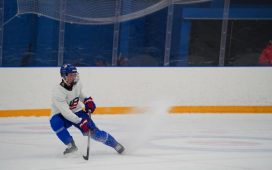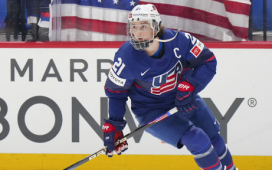The NHL is close to finalizing a return-to-play format, but the regular season appears to be finished. So what happens to hockey pools that depend on regular seasons to determine winners?

As things stand right now, the NHL Players’ Association has authorized further negotiation on the proposed 24-team play-in tournament format, in which seeds 9 to 24 will battle in bracketed series and advance to play a traditional 16-team playoff tournament with the top eight seeds.
As of Monday, the return-to-play process has reached phase 2, in which up to six players can train at team facilities at once. A lot must be determined before the play-in format becomes official – start date, proof the games can take place with players’ safety guaranteed and so on – but it’s clear at this point any hockey that does happen will not include the conclusion of the regular season. In all likelihood, the bottom seven teams have played their final games of 2019-20.
That means all regular-season fantasy hockey pools will have to end in their current states. Since some teams will have players from the bottom seven squads, there’s no way pools will be able to resume fairly with their existing rosters. It’s not a huge problem for any roto league, as it can just crown the first-place team the champion, but it’s a conundrum for head-to-head leagues, which use the final month of the NHL’s regular-season as their playoff brackets. So how do those leagues get resolved? It’s a trivial question relative to what’s going on in the world – but it’s a question I’ve been asked often the past few months, so I’ll try to answer it. Consider these options.
1. Don’t declare a winner – and donate prize money to charity
Make lemonade. Since there’s no perfectly fair way to hand out the prize for your league, here’s a great way to ensure the league wasn’t played for nothing: if there’s a cash prize in your pool, devote it to a noble cause, be it PPE production for frontline workers or something else. No one would ever look back on your 2019-20 league as a waste.
2. Turn your head-to-head league into a roto league and crown a winner
This works best for online pools that track the stats for you. If we use Yahoo leagues as an example: even the head-to-head leagues have sections that show league-wide roto leaders in every stat category. If you can’t crown a champ based on matchups, you can use the accumulated season stats to determine the best squad in relative strength. The roto numbers often tell a truer story than the standings, which can occasionally be fluky and schedule-based in head-to-head leagues. For instance, sometimes you post the second-best numbers of the week but happen to face the team with the best numbers, so you take a massive loss.
3. Use ‘Fantasy Fantasy Hockey’ to determine the winner
I’ve been on my horse about this method throughout the COVID-19 hockey shutdown. Take all the rosters who qualified for the playoffs in your head-to-head league, upload them into NHL 20 and simulate the playoffs in video-game format. You can stream the matchups on YouTube. Having done a variation of this, I can’t stress enough how shockingly suspenseful and fun it is to watch your AI team play onscreen.
4. Use the standings, split the money
If you don’t have a money prize for your league, your only standings-based option is to declare the first-place team the winner, which is pretty boring. A money-based league at least gives you the option to chop up the earnings among the top three or five squads, which feels a bit more just.
5. Redraft for the real playoffs – and make them your fantasy playoffs
The only way to erase the problem of some fantasy rosters having players whose seasons are done: change the fantasy rosters. Take the playoff teams from your league and create a merit-based draft order, meaning first place gets rewarded with the first pick. From there, run a traditional playoff pool (in which you draft guys you think will make deep runs in the real-life post-season, and so on). This is the only 2019-20 pool solution that involves deciding the winner via actual NHL games.
This is an edited version of a story that appeared in The Hockey News 2020 Rookie Issue. Want more in-depth features, analysis and opinions delivered right to your mailbox? Subscribe to The Hockey News magazine.








